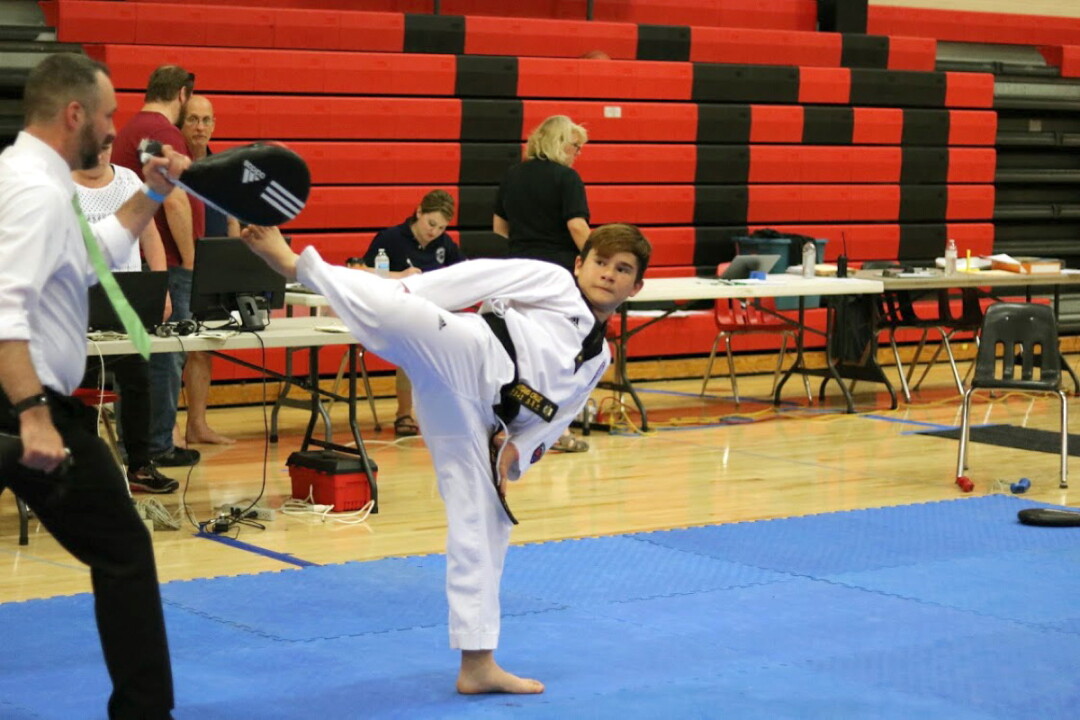Kicking Higher and Higher
Eau Claire taekwondo competitors take aim at national tourney

My first cognition of taekwondo – as it may have been for you and much of the public – was in September 1988 during the Summer Olympics in Seoul, South Korea. This was its Olympic debut as a demonstration sport, and taekwondo was fresh to those of us whose awareness of martial arts was limited to karate. In the ensuing three decades, taekwondo has continued to spread across the United States. This summer, a team of young athletes from around Eau Claire could become national champions.
In a matter of months, it is possible that youngsters from Northwoods Elementary, DeLong and South Middle schools, and Memorial High School could be tops in America.
John McCrackin is a veteran of taekwondo, practicing the Korean martial art since 1985 – before that Summer Olympic spotlighting – and teaching it since 1995. He works with a team from American Taekwondo & Fitness in Eau Claire, an organization founded and run by Henk Boese, and an operation that stays small to ensure thorough instruction in their classes. Their approach, according to McCrackin, is “to maintain a balance with the traditional self-defense focus of the martial art, and the more modern sport elements. The sport end has been our biggest trend in recent years.”
Taekwondo places an emphasis on kicking, with McCrackin’s athletes homing in on rear-leg kicking. If you watch them, you will see the rear-foot round kick, the fast-kick (a “common term for front-foot round kick”), the cut-kick, and the turning back-kick. While these are the physical aspects emphasized by the American Taekwondo & Fitness team, the goals for the students are more holistic; this is the premier principle for McCrackin. “When the students start achieving goals, you can see their confidence build and talent blossom,” he said. Such intangible development can lead to these disciples coaching the next age group of practitioners. “We have always had junior black belt instructors teaching the Kids Classes, and it is fun to watch the admiration and respect the new students give their slightly older instructors.”
In July, USA Taekwondo Nationals are coming to the Twin Cities, the closest the national competition has been to the Chippewa Valley in a decade. However, just because the best of the best are congregating a little west of here doesn’t guarantee our area athletes will be in the running. In order to compete on a national basis, collaboration is critical. McCrackin notes how, in order to grow the caliber of talent to match what is found elsewhere in the country, his team and others in Wisconsin have networked with each other and engaged in camps and tournaments across the Badger State.
For McCrackin’s team, the training began with the start of the year. “The constant focus is always conditioning, agility, and skill-building through a three-phase process,” he said. Phase 1 was the late-January Badger State Games. “We used the (games) as a launching pad to validate our strengths, and address our weaknesses.” The haul: nine gold medals, six silvers, and a bronze. Phase 2 is now underway, applying the learned techniques and culminating with the March Minnesota State Championships to qualify for the summer Nationals. Following early-April’s Park Institute Pan American Taekwondo Tournament, his team will focus on conditioning in the lead-up to what will hopefully be a hearty presence at Nationals. “It is important that we peak physically in July and not get burnt out,” McCrackin noted.
In a matter of months, it is possible that youngsters from Northwoods Elementary, DeLong and South Middle schools, and Memorial High School could be tops in America. As McCrackin sees this, something more important is already progressing. “Winning medals is nice and being awarded the title ‘National Champion’ sounds cool, but the biggest achievement will be the journey it takes to get there,” he said. “Creating memories and friendships that last a lifetime will always be more important than the gold medal you keep in a shoe box.”
Knowing this, perhaps you want to try taekwondo. Perhaps you think your child should take up the martial art. While there may be a variety of motivating factors – “physical fitness, character building, competition, etc.” – John McCrackin knows something even more substantive and enduring will keep taekwondo in one’s life: “What keeps people coming back are the relationships you build, new goals to achieve, and ultimately the giving back portion that’s attained through teaching and coaching.” His team’s road to the Twin Cities has an ultimate destination: an endlessly rewarding life.


















